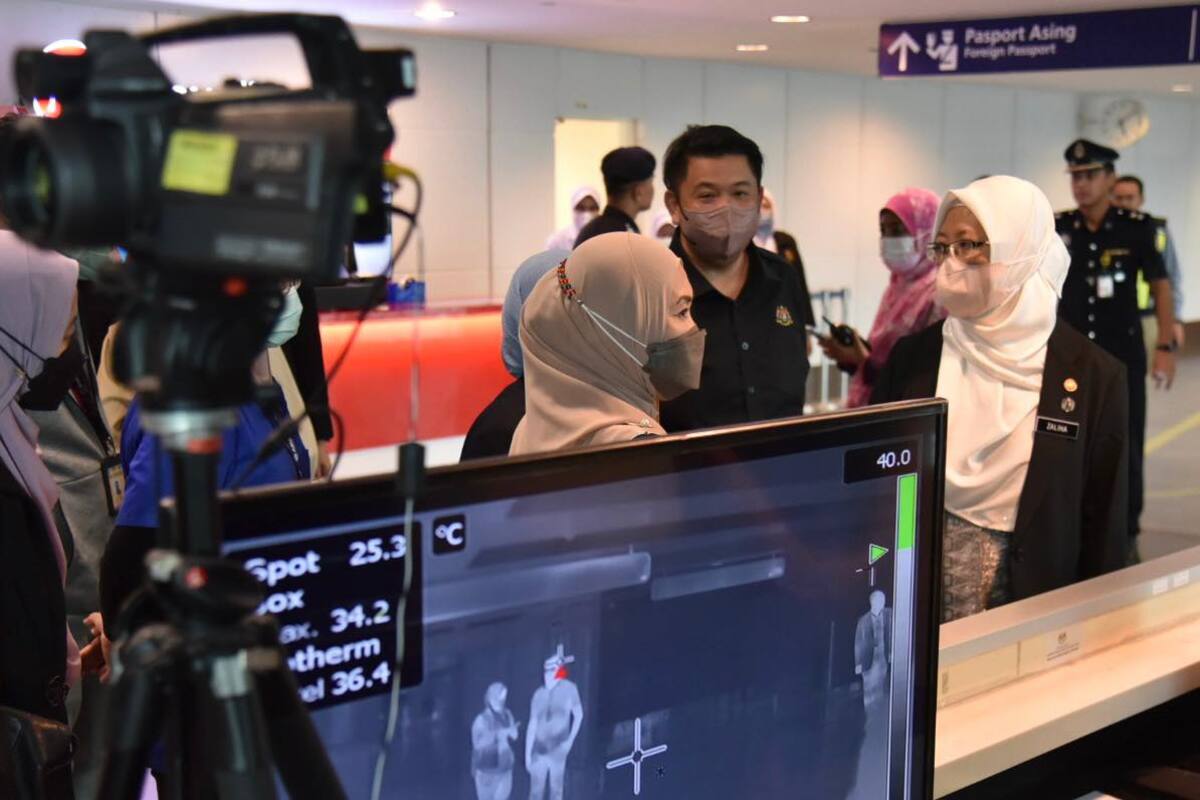KUALA LUMPUR, Jan 3 – The government does not plan to reintroduce blanket mask mandates for flights or indoor public areas, Dr Zaliha Mustafa said today, despite public fears of a potential rise in Covid-19 infections.
The health minister said requirements to wear a face mask would continue to apply only to health care facilities like hospitals and clinics, as well as public transport, “except for flights because they have good ventilation systems”.
“For the rest, we encourage – we strongly encourage – people to continue wearing face coverings, especially in narrow and congested spaces,” Dr Zaliha told a press conference after a visit to Kuala Lumpur International Airport 2 (KLIA2) in Sepang today that was limited to select media for coverage.
CodeBlue obtained an audio recording of her press conference.
Dr Zaliha’s remarks come even as the Melaka state government reportedly plans to reintroduce mask mandates in enclosed spaces and public areas should Covid-19 cases increase. Melaka state health and anti-drug executive councillor Dr Akmal Saleh reportedly said a decision would be made after monitoring the epidemic for the next two weeks.
In guidance updated May 20, 2022, the World Health Organization (WHO) recommends wearing face masks in indoor settings that have adequate ventilation if physical distancing of at least 1 metre cannot be maintained, besides indoor settings with poor ventilation or where ventilation cannot be assessed, as well as outdoor settings where physical distancing of at least 1 metre cannot be maintained.
“It’s not always easy to determine the quality of ventilation. If you have any doubts, it’s safer to simply wear a mask,” states the global health body.
In travel advice dated July 2, 2021, WHO noted that some airplanes have cabin filtration systems equipped with HEPA filters that can remove viruses and germs quickly.
“However, adequate ventilation is just one of the preventive measures to reduce the risk of Covid-19 transmission. Other important measures include maintaining physical distance of at least 1 meter whenever possible, frequent hand hygiene and wearing a mask.”
In guidance updated September 8, 2022, the United States’ Centers for Disease Control and Prevention (CDC) recommends – for people aged two years and older – properly wearing a high-quality mask or respirator in indoor areas of public transportation (such as planes, trains, buses, ferries) and transportation hubs (such as airports, stations, and seaports).
Time magazine reported a study published in March 2021, which predicted Covid-19 infection risk aboard a plane, that showed under the most extreme scenario of a 12-hour flight in which passengers were not wearing masks and one infected person was seated in a tightly packed economy class, other economy passengers had an average infection risk of up to about 11 per cent.
However, for someone seated in very close proximity to the infected person, the risk could rise to 99.6 per cent.
Confirmed Covid-19 infections are still on a downward trend in Malaysia after peaking early last November, but globally, Covid-19 cases have been rising in the Western Pacific region, where Malaysia is located, as well as in Europe and the Americas.
Dr Zaliha reiterated at KLIA2 today the government’s move to implement temperature checks for all travellers arriving from overseas – regardless of where their flights originated from – even though scientists in Malaysia and around the world have known for most of the pandemic in the past three years that the coronavirus can be transmitted by people who do not yet show symptoms.
Health director-general Dr Noor Hisham Abdullah himself, in his Covid report yesterday, acknowledged the existence of asymptomatic Covid-19 patients, saying that these individuals would be monitored via MySejahtera through the app’s home assessment tool.
“What we’re doing at KLIA, we’re monitoring, like what I said previously, the entry of tourists from abroad. Without discriminating, we monitor whether they have fever,” Dr Zaliha told reporters.
“Everyone who goes through that path, we can monitor their body temperature. If they are found to have fever or symptoms, we will send them straight for treatment at a nearby clinic, meaning in KLIA itself.
“I would like to state – from my visit to CPRC (Crisis Preparedness and Response Centre) and to KLIA – to our people that the Ministry of Health (MOH) is truly, truly serious in our concern for the people’s health.”
Dr Zaliha said that MOH is “constantly monitoring almost all the time” because the CPRC operates 24 hours a day.
“Everyday, CPRC looks at it; there is real data from other states. When there are cases, it’s straight away logged in CPRC. It’s monitored 24 hours. This isn’t some play thing; we ensure that everyone is safe.”
On whether additional travel restrictions would be taken for travellers arriving from overseas, Dr Zaliha said the Cabinet would discuss the issue tomorrow, adding that she has briefed Prime Minister Anwar Ibrahim on the Covid situation.
“This needs to be a joint decision as it involves national security, public health, the economy, and others. We need to get correct inputs from other ministries as well. In terms of health, God willing, we will do what we can in MOH’s capacity,” she said.
“God willing, tomorrow, we hope for the best decision, which people say will balance between science and data, and society’s perception.”
Many Malaysians have, on social media, urged the government to close borders to travellers from China, even though local infectious disease and public health experts say that travel bans will not prevent a new outbreak or the entry of new variants into Malaysia.
Several countries have instituted various travel restrictions against China, mostly pre-departure negative Covid-19 test requirements, after Beijing announced that international borders would reopen on January 8 despite a huge Covid-19 surge in China. Morocco has decided to ban the entry of all travellers from China, regardless of their nationality.








